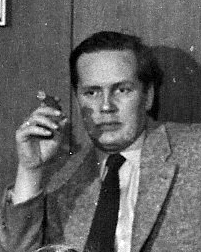
The Bertelsmann SE & Co. KGaA, commonly known as Bertelsmann, is a German private multinational conglomerate corporation based in Gütersloh, North Rhine-Westphalia, Germany. It is one of the world's largest media conglomerates and is also active in the service sector and education.
Random House is an American book publisher and the largest general-interest paperback publisher in the world. It has several independently managed subsidiaries around the world. It is part of Penguin Random House, which is owned by the Germany-based media conglomerate Bertelsmann.

Bantam Books is an American publishing house owned entirely by parent company Random House, a subsidiary of Penguin Random House; it is an imprint of the Random House Publishing Group. It was formed in 1945 by Walter B. Pitkin Jr., Sidney B. Kramer, and Ian and Betty Ballantine, with funding from Grosset & Dunlap and Curtis Publishing Company. It has since been purchased several times by companies including National General, Carl Lindner's American Financial and, most recently, Bertelsmann, which in 1986 purchased what had grown to become the Bantam Doubleday Dell publishing group. Bertelsmann purchased Random House in 1998, and in 1999 merged the Bantam and Dell imprints to become the Bantam Dell publishing imprint. In 2010, the Bantam Dell division was consolidated with Ballantine Books to form the Ballantine Bantam Dell group within Random House. By no later than February 2015, Bantam Books had re-emerged as a stand-alone imprint within Random House; as of 2023, it continues to publish as the Bantam imprint, again grouped in a renamed Ballantine division within Random House.

Dell Publishing Company, Inc. is an American publisher of books, magazines and comic books, that was founded in 1921 by George T. Delacorte Jr. with $10,000, two employees and one magazine title, I Confess, and soon began turning out dozens of pulp magazines, which included penny-a-word detective stories, articles about films, and romance books.

Will Vesper was a German author and literary critic who was involved in the Nazi book burnings.
Droemer Knaur is a publishing group based in Munich. The group consists of the book publishers Droemer, Knaur, the Pattloch Publisher and O.W. Barth. Droemer Knaur belongs to the Georg von Holtzbrinck Publishing Group.
The Carl Hanser Verlag was founded in 1928 by Carl Hanser in Munich and is one of the few medium-sized publishing companies in the German-speaking area still owned by the founding family.
The Heyne Verlag is a German publisher based in Munich, which was founded in Dresden in 1934 and sold to Axel Springer in 2000. In 2004 it became part of Random House. Heyne was one of the largest publishing houses in Germany in 1999.
Prestel Publishing is an art book publisher, with books on art, architecture, photography, design, fashion, craft, culture, history and ethnography. Lists range from museum guides, to encyclopaedias, art and architecture monographs to facsimile volumes and books for children.

Penguin Random House LLC is an Anglo-American multinational conglomerate publishing company formed on July 1, 2013, with the merger of Penguin Books and Random House. Penguin Books was originally founded in 1935 and Random House was founded in 1927. It has more than 300 publishing imprints. Along with Simon & Schuster, Hachette, HarperCollins and Macmillan Publishers, Penguin Random House is considered one of the 'Big Five' English language publishers.

Gerhard Zwerenz was a German writer and politician. From 1994 until 1998 he was a member of the Bundestag for the Party of Democratic Socialism (PDS).
The Albrecht Knaus Verlag is a German publisher of fiction and nonfiction based in Munich. It was founded in 1978 and is now part of the Random House publishing group. The publisher became known mainly through the works of Walter Kempowski.
Blanvalet is a German publishing house, based in Munich, which was founded in 1935 in Berlin and is now part of the Bertelsmann's Random House publishing group. Blanvalet publishes entertainment literature and non-fiction, first in hardcover, and as paperbacks since 1998. The publisher became well known with the novel series "Angélique". More recent authors include Charlotte Link, Marc Elsberg, Karin Slaughter, Diana Gabaldon and George R. R. Martin.

cbt is a German publisher of children's literature based in Munich. It is part of the Random House publishing group.
cbj is a German publisher of children's literature based in Munich. It was founded in 1968 under the name "C. Bertelsmann Jugendbuchverlag" and is still an independent part of the Random House Publishing Group. cbj publishes works by German and international authors. The publisher was made known by the book series "The Famous Five" by Enid Blyton, among others. In 2008, a part of the program was redistributed in the newly founded cbt publishing.
carl's books is a German fiction publisher based in Munich. It was founded in 2011 and is part of Random House publishing group.
The Elisabeth Sandmann Verlag is a fiction and nonfiction publishing house, which was founded in Munich in 2004 by the publisher Elisabeth Sandmann. Its program is themed Beautiful Books for Clever Women.
Hirmer Publishers is the name used by Hirmer Verlag, a German art book publishing house based in Munich, for its operations in the English-speaking world.
Hans Schnoor was a German musicologist, journalist and music critic. In the late 1950s, he attracted media attention with his denunciation of Arnold Schönberg's A Survivor from Warsaw.

Roland Gööck (1923–1991) was a German editor and non-fiction author who, from 1954, was in charge of the publishers, Bertelsmann.







